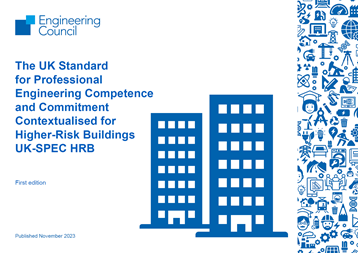Engineering Council

What is the UK Standard for Professional Engineering Competence and Commitment Contextualised for Higher-Risk Buildings (UK-SPEC HRB)?
The UK Standard for Professional Engineering Competence and Commitment Contextualised for Higher-Risk Buildings (UK-SPEC HRB) is a new Standard from the Engineering Council that sets out the competences and commitments expected of engineers and technicians who work in the built environment sector, in particular on higher-risk buildings.
UK-SPEC HRB is a version of UK-SPEC that has been contextualised for engineers and technicians involved in building work, including design, construction, maintenance and operation. It incorporates the British Standards Institution, Built environment – Core Criteria for building safety in competence frameworks – Code of practice (BSI Flex 8670), which sets out core building safety competence criteria, including fire safety, structural safety and public health.
Assessment to UK-SPEC HRB, and admission to the Engineering Council’s HRB Register, provides assurance to building owners and occupants that an engineer or technician is competent to carry out work that complies with building regulations, and is committed to practising ethically and in accordance with their professional engineering institution’s code of conduct. Ethical practice is defined in our Statement of Ethical Principles.
View or download UK-SPEC HRB here.
Why have we developed UK-SPEC HRB?
UK-SPEC HRB has been developed in response to a proposal in Dame Judith Hackitt’s independent review of building regulations and fire safety, ‘Building a Safer Future’. Commissioned by the UK government in the aftermath of the Grenfell Tower Fire in 2017, ‘Building a Safer Future‘ included a proposal that “The relevant professional engineering institutions (PEIs) should work with the Engineering Council to develop a contextualised standard for chartered and incorporated engineers working on HRRBs.”
Following publication of Dame Judith’s report, bodies from across the built environment sector formed a Competence Steering Group to address her recommendations for improving competence in the sector. The group published two reports – Raising the Bar (2018) and Setting the Bar (2020), which informed the development of the Building Safety Act 2022. The Competence Steering Group promoted development of contextualised standards for all trades and professions undertaking building work and oversaw development of an initial overarching competence framework that was the starting point for development of British Standards Institution, Built environment – Core Criteria for building safety in competence frameworks – Code of practice (BSI Flex 8670).
How can I become registered?
To become registered, you will need to be a member of one of the professional engineering institutions (listed below) that we have licensed to carry out assessment to UK-SPEC HRB.
UK-SPEC HRB follows the same structure as UK-SPEC. It sets out a ‘core’ framework with annexes that cover specific disciplines. For some engineers and technicians, demonstrating competence could involve registration against the core framework only. For others it might include one or a combination of the discipline annexes (see below).
Your institution will assess your qualifications, training and experience and let you know if anything further is required. Once you meet the registration criteria and have completed the registration process they will submit a registration form to us on your behalf. Please note, not all PEIs can assess potential registrants against UK-SPEC HRB.
The initial discipline annexes are:
Professional engineering institutions licensed to award professional HRB registration
Chartered Association of Building Engineers (CABE)
Chartered Institution of Building Services Engineers (CIBSE)
Institution of Fire Engineers (IFE)

